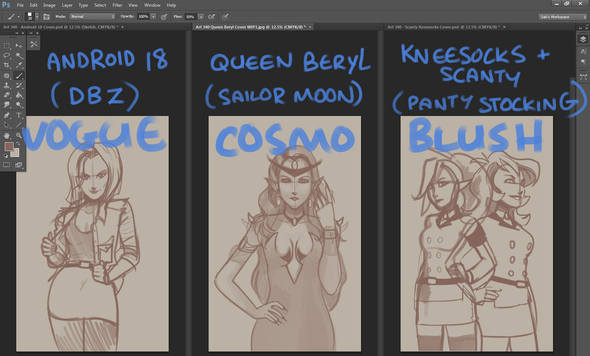Happy birthday to meee! c:
(Got this sweet birthday artwork from my ART BRO @CALAVERA145!)
Off to Philadelephia tomorrow to hang with my pals at Stamper's, too! Seeya on the other side! c:
Direct any business inquiries to sabtastique@gmail.com, send a PM here, or hit me up on Instagram!
Female
Artist
University of Alberta
Edmonton, Alberta, Canada
Joined on 7/3/09
Posted by Sabtastic - April 28th, 2014
Happy birthday to meee! c:
(Got this sweet birthday artwork from my ART BRO @CALAVERA145!)
Off to Philadelephia tomorrow to hang with my pals at Stamper's, too! Seeya on the other side! c:
Posted by Sabtastic - February 28th, 2014
I'M SO HEARTBROKEN I DREW THIS PICTURE IN MS PAINT WITH MY RIGHT HAND TO SHOW YOU HOW SHITTY I FEEL </3 </3 </3
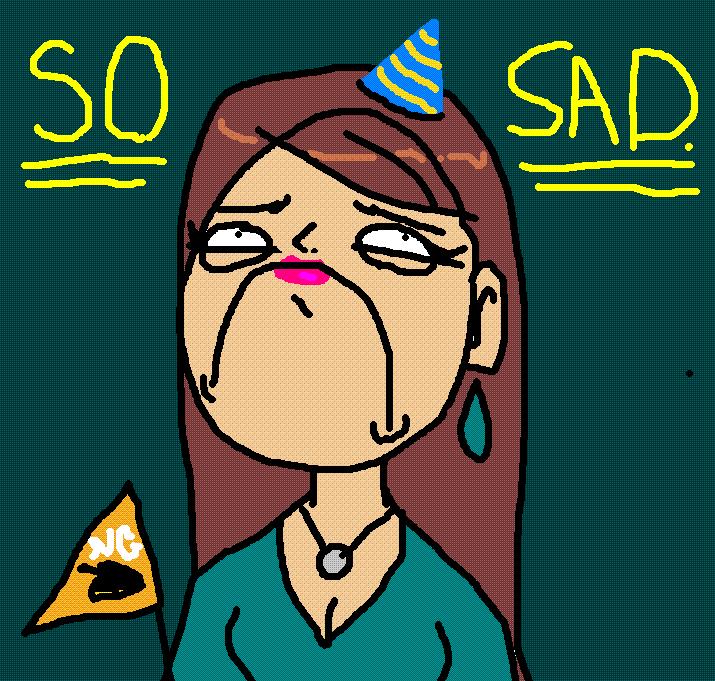
Real talk tho; I'm really, really bummed. I WILL be visiting a few days AFTER Pico Day if anyone decides to stick around for that long, (if you are, let me know!) but on the day of the party I will be out in Calgary Alberta selling artwork at Calgary Comic and Entertainment Expo. A good guess is that I won't be there until the 29th. THREE DAYS FASHIONABLY LATE.
Luis joked about doing a "Nene Day" in early May so I can waste all of my comic con money on partying my face off for my 24th birthday. WHOS WITH ME?! LOLOL LETS DO THIS
Posted by Sabtastic - January 24th, 2014
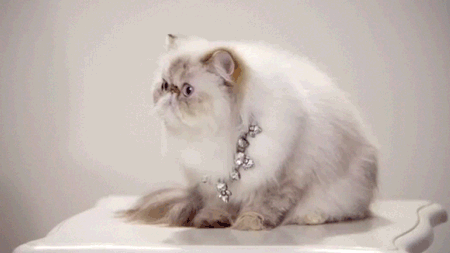
.................... THREE THOUSAND FANS!?!
Thankyouthankyouthankyouthankyouthankyouthankyouthankyouthankyouthankyouthankyouthankyouuuu!
Your support for my artwork means the world to me, so I just want to send out a big thanks to everyone who's taken the time to click that little heart icon so they can subscribe to my stuff...!! <3 More art is on the way!!
Posted by Sabtastic - January 11th, 2014
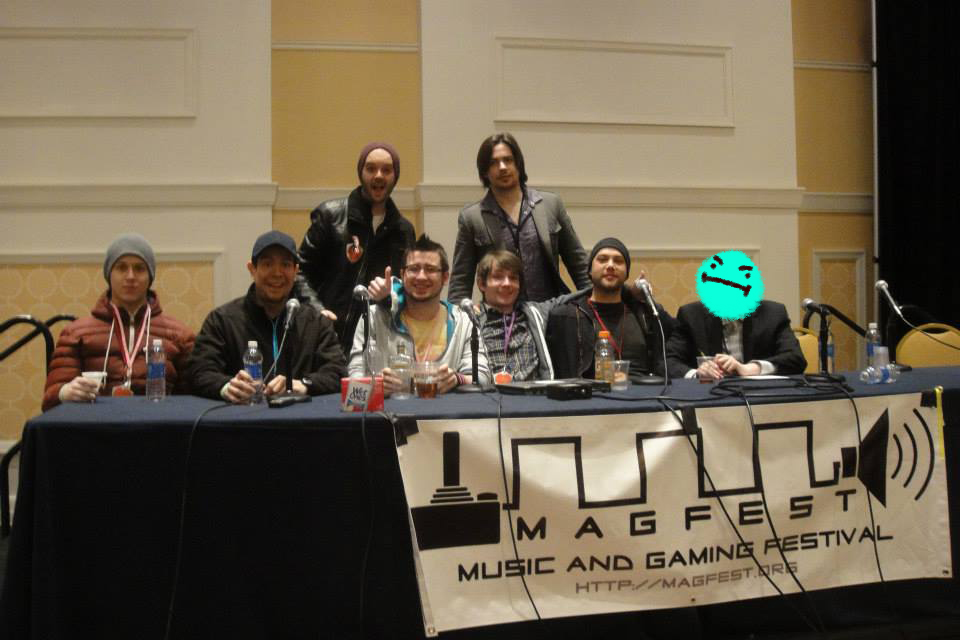
Magfest 2014's Animator's Panel featuring (from left to right)
OneyNG, El-Cid, Stamper, Spazkid, RubberNinja, Egoraptor, RicePirateMick, and Mystery Guy!
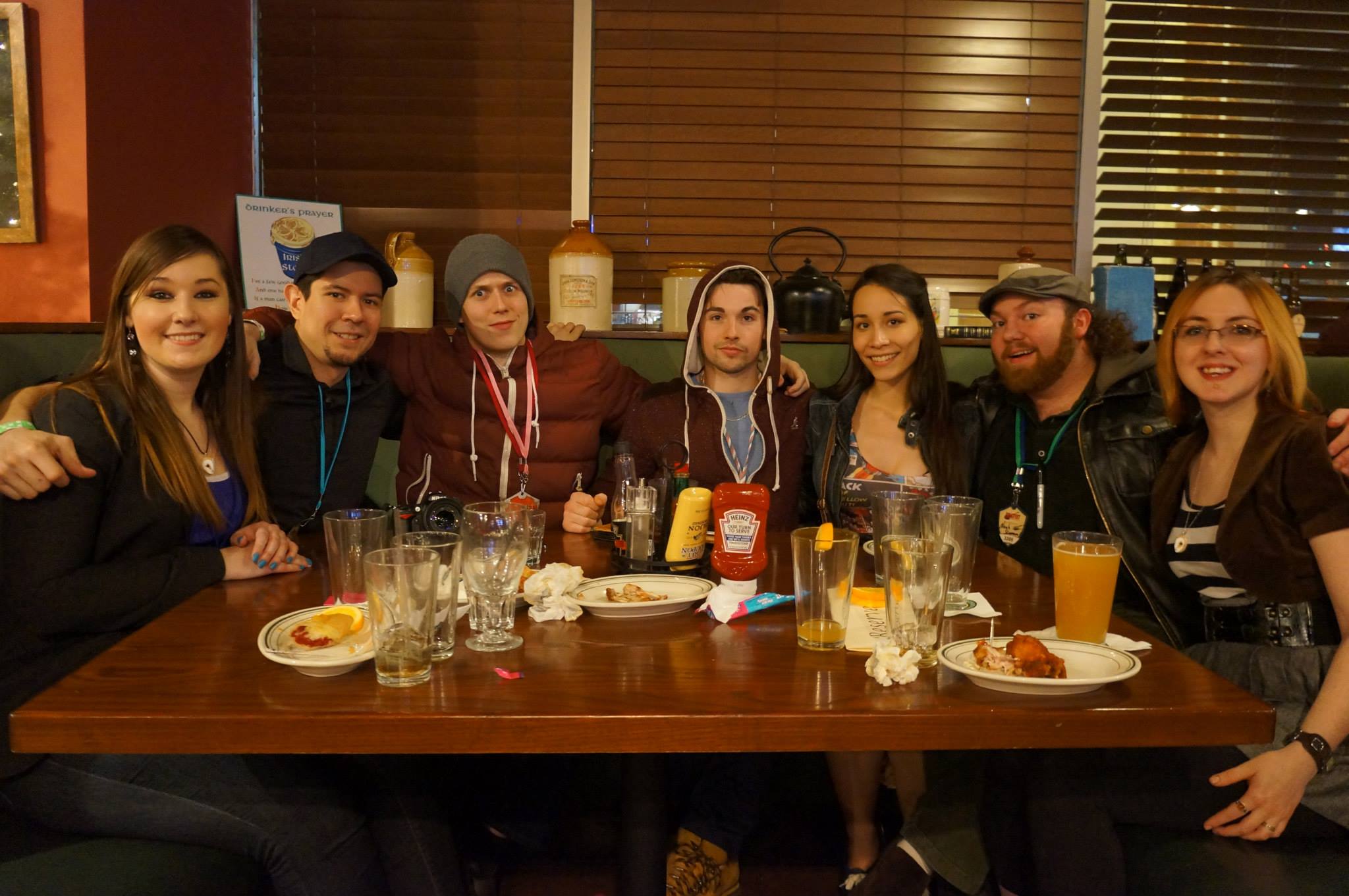
Day 2 at Magfest - At an Irish Pub: (from left to right)
Myself, El-Cid, Oney, Oney's Friend Paddy, Erica, LeftHandedSock, and CosmicDeath!
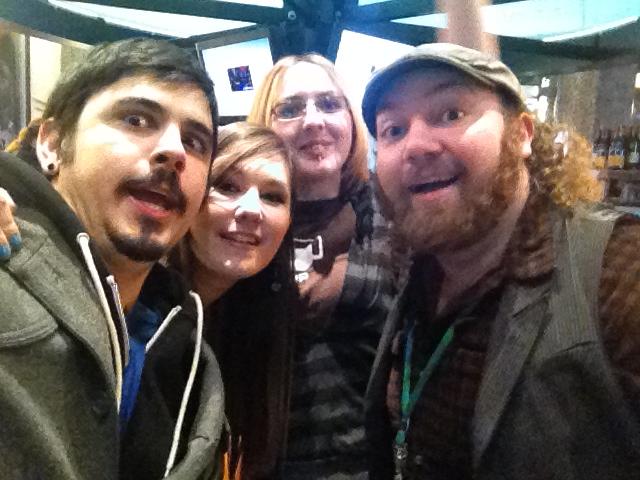
Day 3 at Magfest - the sports bar: (from left to right):
AlmightyHans, Myself, CosmicDeath, LeftHandedSock
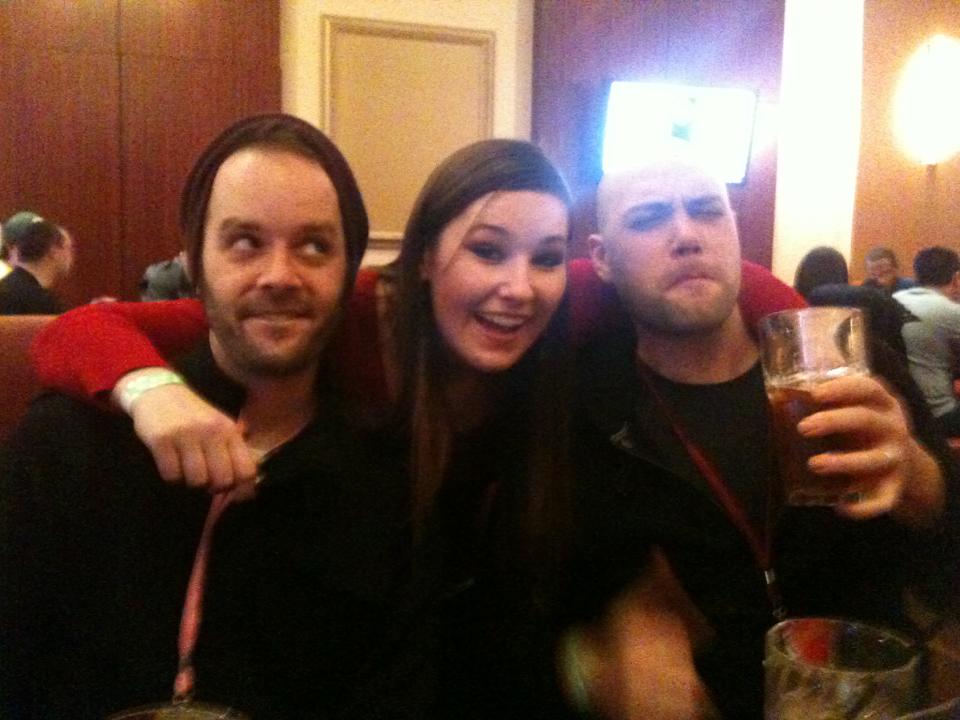
Day 1 at Magfest - Suppertime at the Hotel (from Left to right)
Stamper, Myself, and RicepirateMick
Posted by Sabtastic - December 29th, 2013
Flying out to Philadelphia on Dec 29th stay over at Stamper's with Oney, Psychicpebble, Spazkid, Shadman and CosmicDeath, then taking the train to New York for New Years at JonTron's, and THEN road-tripping out to Newport Maryland with JohnnyUtah, El-Cid, and AlmightyHans for Magfest 2014 to meet up with Ricepirate, Kirbopher, RubberNinja, and Egoraptor! Weeeee!
Can't even handle how excited I am for this trip. Meeting up with way too many cool people.
Will be back in Canada-land on January 7th!
Happy New Year Everybody!
Update: 6:30am Mon Dec 30 Calgary:
Missed my connecting flight in Calgary at 1am... :( Waited up all night to get on a new one. No idea where my luggage is; I'm told it went on without me to Toronto and I might not be able to pick it up there. Boarding my new flight to Toronto and then Philly in half an hour. First time missing a connecting flight and being stuck in the middle of nowhere. Not a good feeling at all... :(
Could have been worse I guess.
Update: 10:00am Tues Dec 31st: Philadelphia:
Landed in Philly last night around 4:30pm--! Everything worked out just fine at the airport and now I'm safe and sound over at Stamper's. So unbelievably tired. I'd been in transit for literally 12 hours and I hadn't slept for over 24!
Posted by Sabtastic - November 26th, 2013
I wish someone told this to me when I was 12 years old and just starting out with art.
This is a message to all the new and emerging artists interested in breaking into the art industry:
If you've ever tried selling your artwork, you need to know that there are people out there who will willingly (or unknowingly) take advantage of you as an artist and I want you to know how to spot them, and how not to undersell yourself.
Being paid with "exposure" or "free advertisement" and "good experience":
This is one of the worst and most prominent issues I've experienced as an artist: No matter what, "exposure" is not an acceptable form of payment for you as an artist. At the end of the day, you're not being compensated for your time and talents. Exposure might sound useful if you don't have a lot of viewers or subscribers yet, but it doesn't guarantee you any more job offers, n'or does it put money in your pocket. You can't pay bills with "exposure", and respectable employers know that. Don't be afraid to call people out on these things. Often times they don't understand or appreciate the value of art.
Here are some actual examples of what this might look like:
- "Pay? Are you kidding me? This is going to be a viral hit!"
- "I want to find someone who can work with me as a partner and not an "employee"."
- "I know this may not attract as many artists, but the ones that are only looking to get paid are not the ones that we are looking for"
- "This is an unpaid position but great experience. Carly Rae Jepson will be attending."
- "since I'm not intending to sell this I don't want to be paying for artwork."
Quotes from @Forexposure_txt on Twitter.
"Contests" or "Collaborations" disguised as Crowd-Sourced Design Scams:
99Designs is an example, and this video makes me sick. Art contests and collaborations can be innocent enough, but be cautious when volunteering your time and talent for them. Often they're just an excuse for businesses or individuals to pay a small flat rate as a "prize" for a large selection of free artwork that they can use for their own benefit. You're literally giving your work away for free if you're not successful. It's like buying a cheap lottery ticket for a chance to win your paycheck, and that's not fair to you as an artist.
Companies that use crowd-sourced design are real and somehow thriving. Stay away! They don't care about you, and they're just interested in getting what they want for as cheap as possible!
Protect Your Artistic Career. Know your worth.
Stephen Silver couldn't have said it better in his Youtube video. You as an artist have a marketable skill. Your work has taken years if not decades to perfect. Although there may be artists out there with similar skills, no one is exactly the same as you, and they don't possess your style. You're marketing your unique product to people that probably can't create the artwork themselves. When you sell artwork for $5-10, even $20 or $100 dollars, think about how many hours you put into the project. If you spent 3 hours drawing something you sold for $20 dollars, you're giving yourself LESS THAN MINIMUM WAGE---less than 7 dollars per hour, to be exact. That's not fair to you, even if you enjoy that particular project, or it's for a 'friend'.
Art "Requests":
These are not commissions. If someone approaches you with an "art request", it's usually safe to safe to assume that this person has absolutely NO intention of paying you.
Do not agree to these if you think you can convince them to pay you later.
How and When to Accept Payment for your Artwork:
Although it can depend on the type of artwork involved, you can avoid being ripped off by taking payments up-front, and you shouldn't be afraid to demand that. I take all of my payments through Paypal.com or in person. Imagine spending days, weeks, or months on a project, only to have the person who agreed to pay you disappear completely, or even worse, STEAL your completed artwork without paying you a cent. This can and will happen if you aren't careful, and it's happened to me. Of course the opposite can be true with artists running away with payments, but that's another matter entirely. Another approach is to accept a down payment of 50% before beginning your work, and then accepting the rest of the payment upon completion. It's also useful to type up a contract or some form of written agreement, to make sure you and the payee are on the same page. Additionally, keeping records of your conversations as a paper trail is strongly recommended.
______________________________________________________
All in all, there are a lot of "starving artists" out there because we constantly under-sell ourselves.
Hopefully this post is useful to you, and/or your artistic friends.
Also feel free to share your experiences and add your input! We can all learn from each other.
Posted by Sabtastic - November 5th, 2013
Sorry I'm super inactive here guys. Just in school and busy with art classes. :(
I've never had so many projects or commissions on the backburner though... UGH.
Counting down the days 'till I get to go back to my own artistic endeavors. :c (P.S. IT'S ONLY 11 MORE CLASSES)
KEEP IT REAL.
-Sabba-dabba-doo
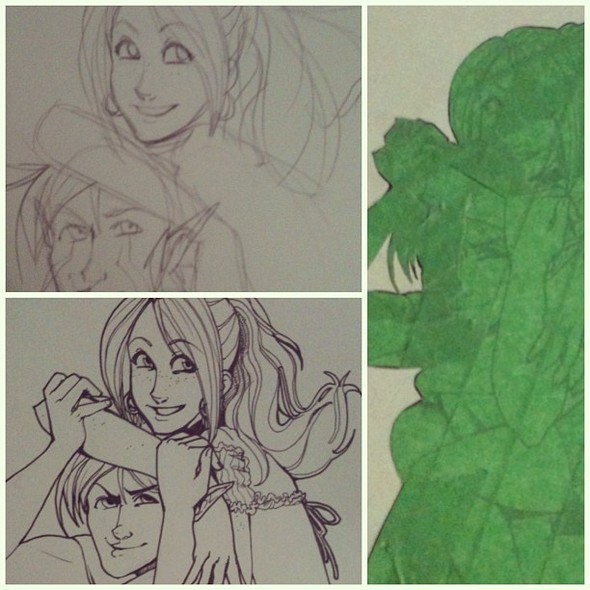
Posted by Sabtastic - October 7th, 2013
OMG YOU GUYS, I FINALLY GET TO USE MY TABLET + PHOTOSHOP FOR AN ART PROJECT IN A CLASS!!! AAAA! :D
The prof gave us a super open-ended project that:
1. Involves the body
2. Includes Mark-Making
3. Is comprised of 3-5 related images.
There's a bit more criteria, but for the most part, I sweet-talked her into letting me do something that I would probably draw FOR FUN and eventually SELL anyway. o___o ...I'm still somewhat in denial. It's too good to be true!
Anyway, the main theme I've narrowed down involves body image. I'm trying to embrace the style of Anime as well, seeing as I really enjoy it, and it fits conveniently well with my series. The characters in question are all female villains frompopular anime shows. Android 18, Queen Beryl, and Kneesocks+Scanty. I chose these three because they aren't completely human. They're humanoids, but generally supernatural to some extent. I combined this with the fact that they would all be beautiful models on the cover of magazines. What I'm attempting to point out is that what we generally see on the cover of a magazine is a hyper-idealized, impossible standard that isn't an accurate representation of the average human woman. ...Pretty cliche message, I guess, yeah, but I think it works! :)
So far I'd really like to add Team Rocket's Jesse, and maybe Lust from FMA, but we'll see how much time I get to add to this project.
